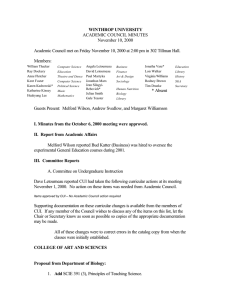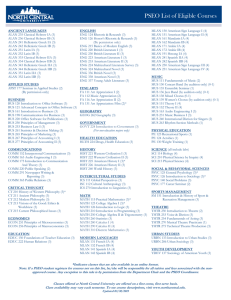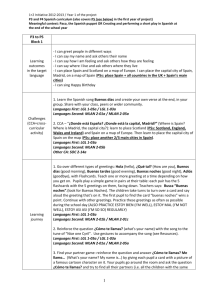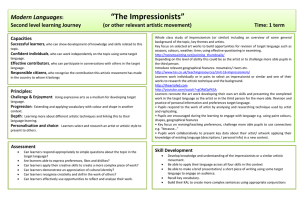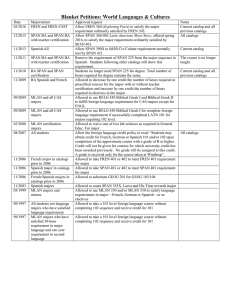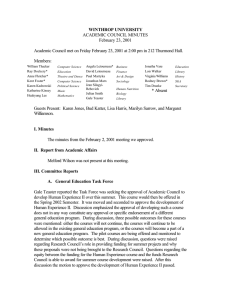Listen actively and explore Recall learned vocabulary (Recall learned
advertisement
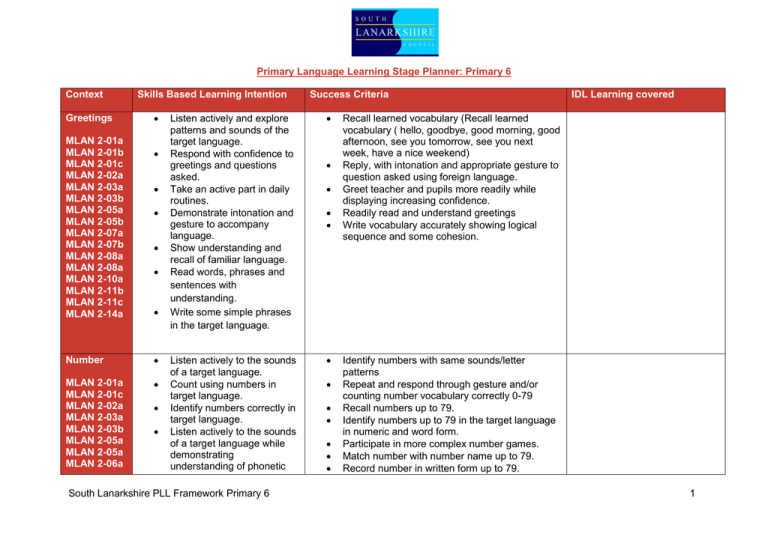
Primary Language Learning Stage Planner: Primary 6 Context Greetings MLAN 2-01a MLAN 2-01b MLAN 2-01c MLAN 2-02a MLAN 2-03a MLAN 2-03b MLAN 2-05a MLAN 2-05b MLAN 2-07a MLAN 2-07b MLAN 2-08a MLAN 2-08a MLAN 2-10a MLAN 2-11b MLAN 2-11c MLAN 2-14a Skills Based Learning Intention Number MLAN 2-01a MLAN 2-01c MLAN 2-02a MLAN 2-03a MLAN 2-03b MLAN 2-05a MLAN 2-05a MLAN 2-06a Success Criteria Listen actively and explore patterns and sounds of the target language. Respond with confidence to greetings and questions asked. Take an active part in daily routines. Demonstrate intonation and gesture to accompany language. Show understanding and recall of familiar language. Read words, phrases and sentences with understanding. Write some simple phrases in the target language. Listen actively to the sounds of a target language. Count using numbers in target language. Identify numbers correctly in target language. Listen actively to the sounds of a target language while demonstrating understanding of phonetic South Lanarkshire PLL Framework Primary 6 IDL Learning covered Recall learned vocabulary (Recall learned vocabulary ( hello, goodbye, good morning, good afternoon, see you tomorrow, see you next week, have a nice weekend) Reply, with intonation and appropriate gesture to question asked using foreign language. Greet teacher and pupils more readily while displaying increasing confidence. Readily read and understand greetings Write vocabulary accurately showing logical sequence and some cohesion. Identify numbers with same sounds/letter patterns Repeat and respond through gesture and/or counting number vocabulary correctly 0-79 Recall numbers up to 79. Identify numbers up to 79 in the target language in numeric and word form. Participate in more complex number games. Match number with number name up to 79. Record number in written form up to 79. 1 MLAN 2-06b MLAN 2-07b MLAN 2-08a MLAN 2-08b MLAN 2-11a MLAN 2-11b MLAN2-11c MLAN 2-13a MLAN 2-13b MLAN 2-14a Calendar MLAN2-01a MLAN2-01b MLAN 2-01c MLAN2-02a MLAN 2-05a MLAN 2-07b MLAN 2-08a MLAN 2-08b MLAN 2-09a MLAN 2-10a MLAN2-11a MLAN 2-11b MLAN 2-11c MLAN 2-11d MLAN 2-13a MLAN 2-13b MLAN 2-14a Weather MLAN 2-01a MLAN 2-01b MLAN 2-01c MLAN 2-02a sounds in words. Tell time in target language Read words, phrases and sentences with understanding. Write some simple phrases in the target language. Listen actively to the sounds of a target language while beginning to demonstrate understanding of phonics, rhyme and rhythm. Use target language in everyday routines. Be able to respond appropriately to questions asked. Read words, phrases and sentences with understanding. Write some simple phrases in the target language. Listen actively to the sounds of a target language while beginning to demonstrate understanding of phonetic sounds in words. Use target language in South Lanarkshire PLL Framework Primary 6 Complete simple Maths problems using language for addition, subtraction, multiplication and division. Repeat and recall times using o’clock and half past in oral and written form using digital and analogue clocks. Repeat vocabulary considering pronunciation. Order days and months accurately. Use days and months as part of the date. Ask and Respond correctly to the questions. Read and match days of the week, months and seasons. Write vocabulary for calendar correctly. Read and understand labels and words on a calendar. Recall and write learned vocabulary with increasing accuracy (it is nice/not nice/warm/cold/rainy/sunny/windy/frosty/foggy/sn owy Match picture to text of short phrases. Identify words with same sounds/letter patterns 2 MLAN 2-03a MLAN 2-03b MLAN 2-06a MLAN 2-06b MLAN 2-07a MLAN 2-07b MLAN 2-08a MLAN 2-08b MLAN 2-11b MLAN 2-11c MLAN 2-11d MLAN 2-13a Classroom Objects MLAN 2-01a MLAN 2-01b MLAN 2-01c MLAN 2-03a MLAN 2-03b MLAN 2-07a MLAN 2-07b MLAN 2-08a MLAN 2-08b MLAN 2-11c. MLAN 2-13a MLAN 2-13b MLAN 2-14a everyday routines. Participate in conversations about weather using connectives. Apply learned vocabulary to write about weather in real and imaginary situations. Participate in role play activities through listening, talking and reading. Read words, phrases and sentences with understanding. Write some simple phrases in the target language. Listen actively to the sounds of target language while beginning to demonstrate understanding of phonetic sounds in words. Use target language in everyday routines Participate in conversations about classroom items using plurals, adjectives and connectives. Apply learned vocabulary to write about classroom objects in real and imaginary situations. Participate in role play activities through listening, South Lanarkshire PLL Framework Primary 6 Ask and respond readily to question, What is the weather like? Using a simple connective like and or but e.g it is cold but sunny. Read and demonstrate comprehension of simple weather related vocabulary. Match learned vocabulary to diagrams and pictures describing the weather. List seasons in target language and identify typical weather types in each season in written form. Recall and write learned vocabulary with increasing accuracy. . (door, window, seat, table, pencil, rubber, sharpener, bin, bag, classroom, ruler, book, desk, tray, jotter, whiteboard, pen, crayon ,pencil case, games, scissors, paper, gluestick) Repeat new vocabulary correctly: teacher’s desk, computer, cupboard, sink, altar Match picture to text of short phrases. Identify words with same sounds/letter patterns Ask and respond readily to question, What is this? Who has..? What does …look like? What do you have? Using a simple connective like and or but as well as Participate in conversations with the teacher using phrases.. I don’t have… I have lost…. I need a…. 3 Colours MLAN2-01a MLAN2-01b MLAN 2-01c MLAN2-02a MLAN 2-05a MLAN 2-07b MLAN 2-08a MLAN 2-08b MLAN 2-09a MLAN 2-10a MLAN2-11a MLAN 2-11b MLAN 2-11c MLAN 2-11d MLAN 2-13a MLAN 2-13b MLAN 2-14a talking and reading. Read words, phrases and sentences with understanding. Write some simple phrases in the target language. Link words together to create written sentences about classroom objects. Listen actively to the sounds of a target language while beginning to demonstrate understanding of phonetic sounds in words. Use target language in everyday routines. Participate in conversations about colours using connectives. Apply learned vocabulary to write about colours in real and imaginary situations. Participate in role play activities through listening, talking and reading. Read words, phrases and sentences with understanding. Write some simple phrases in the target language. Recall and write learned vocabulary with increasing accuracy (red, blue, green, yellow, purple, orange, black and white, brown, grey and school uniform colours, light blue, dark blue, turquoise) Repeat new vocabulary: gold, silver Match picture to text of short phrases. Identify words with same sounds/letter patterns Ask and respond readily to question, What colour is your t-shirt/jumper/skirt? What colour is this jotter? What colour are your trousers /shoes? Using a simple connective like and or but as well as Ask and respond readily to question: What is your favourite colour? My favourite colour is... I like/I don’t like… Link words together to create written sentences about colours. Read and demonstrate comprehension of simple colour related vocabulary. Match learned vocabulary to diagrams and pictures describing colours/clothing. South Lanarkshire PLL Framework Primary 6 4 Food MLAN 2-01a MLAN 2-02a MLAN 2-03a MLAN 2-03b MLAN 2-05a MLAN 2-05b MLAN2-07a MLAN 2-07b MLAN 2-08a MLAN 2-08b MLAN2-11b MLAN 2-11c MLAN 2-11d MLAN 2-13a MLAN 2-14a Listen actively to the sounds of the target language. Explore sounds and patterns of the target language – focus on understanding of phonetic sounds in words and pronunciation. Read words, phrases and sentences with understanding. Write some simple phrases in the target language. Body MLAN2-01a MLAN 2-02a MLAN2-03b MLAN 2-05a MLAN 2-07b MLAN 2-08a MLAN 2-08b MLAN 2-09a MLAN 2-13a MLAN 2-13b MLAN 2-13b MLAN 2-14a Listen actively to the sounds of the target language while demonstrating a simple understanding of phonics, rhyme and rhythm in the target language compared to own language. Read words, phrases and sentences with understanding. Write some simple phrases in the target language. South Lanarkshire PLL Framework Primary 6 Begin to identify phonetic sounds and patterns in food vocabulary. Read aloud supermarket food vocabulary eg in games, in supermarket, with increasing focus on pronunciation. Read and demonstrate simple comprehension of supermarket vocabulary-match pictures to text of short phrases and sentences. Recall learned and new food vocabulary (playtime, lunchtime and Supermarket food). Write food vocabulary independently using known phonetic patterns, with increasing accuracy (use connectives where appropriate) – eg shopping list. Respond to questions in target language eg. I am looking for, I need. Children should list items using connectives. Use target language in roleplay supermarket activities. Discuss, compare and ask questions related to the way phonics work in the target language. Consistently speak using correct pronunciation and use knowledge of phonemes to extend this to reading. Read and discuss short texts related to health. Respond to the question “Is there something wrong?” or “How are you feeling?” with a statement relating to feeling unwell or sore. Label body parts in writing. Write (or add to partly written) sentences relating to parts of the body, health and appearance. Orally describe own appearance. 5 Clothes MLAN2-01a MLAN2-01b MLAN 2-01c MLAN2-02a MLAN 2-05a MLAN 2-07b MLAN 2-08a MLAN 2-08b MLAN 2-09a MLAN 2-10a MLAN2-11a MLAN 2-11b MLAN 2-11c MLAN 2-11d MLAN 2-13a MLAN 2-13b MLAN 2-14a Personal Information MLAN2-01a MLAN2-01b MLAN 2-01c MLAN2-02a MLAN 2-05a MLAN 2-07b MLAN 2-08a MLAN 2-08b MLAN 2-09a MLAN 2-10a MLAN2-11a MLAN 2-11b Listen actively to the sounds of the target language while demonstrating a simple understanding of phonics, rhyme and rhythm in the target language compared to own language. Participate in discussions about which clothes would be worn in different seasons. Read and understand texts about Read words, phrases and sentences with understanding. Write some simple phrases in the target language. Listen actively, demonstrating an understanding of phonics and patterns in the target language. Identify specific words and phrases in order to relay information about a partner. Respond with confidence to questions asked. Create a short role play with a partner. Read words, phrases and sentences with South Lanarkshire PLL Framework Primary 6 Discuss, compare and ask questions related to the way phonics work in the target language. Read and discuss short texts related to clothes. Respond to the question “what are you wearing?” “what are you going to wear?” Respond to the question “What do you wear in winter?” “What do you wear in summer?” etc Label clothes using own writing. Begin to include colour adjectives Write (or add to partly written) sentences relating to clothes. Orally describe own clothes including colour and other adjectives such as long/short Recall learned vocabulary for family (parents, siblings, grandparents) and hobbies (swimming, gymnastics, football, dancing etc) Repeat vocabulary linked to personal description (tall, short, hair and eye colour) Match appropriate correct question and answer information. Begin to ask for help using learned phrases ( I don’t have a..., I don’t understand) Write simple texts of increasing length on myself. Express a personal response (for example, likes, dislikes and feelings) Use a bilingual dictionary with increasing confidence. 6 MLAN 2-11c MLAN 2-11d MLAN 2-13a MLAN 2-13b MLAN 2-14a understanding. Write some simple phrases in the target language. South Lanarkshire PLL Framework Primary 6 7
